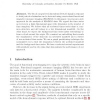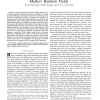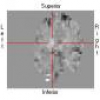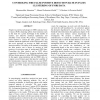27 search results - page 1 / 6 » Analysis of Event-Related fMRI Data Using Diffusion Maps |
IPMI
2005
Springer
14 years 5 months ago
2005
Springer
The blood oxygen level-dependent (BOLD) signal in response to brief periods of stimulus can be detected using event-related functional magnetic resonance imaging (ER-fMRI). In this...
IPMI
2003
Springer
14 years 5 months ago
2003
Springer
We explore a new paradigm for the analysis of event-related functional magnetic resonance images (fMRI) of brain activity. We regard the fMRI data as a very large set of time serie...
TMI
1998
13 years 4 months ago
1998
Abstract—Functional magnetic resonance images (fMRI’s) provide high-resolution datasets which allow researchers to obtain accurate delineation and sensitive detection of activa...
ISBI
2002
IEEE
14 years 5 months ago
2002
IEEE
In this paper we derive an independent-component analysis (ICA) method for analyzing two or more data sets simultaneously. Our model extracts independent components common to all ...
ISBI
2004
IEEE
14 years 5 months ago
2004
IEEE
Despite its potential advantages for fMRI analysis, fuzzy C-means (FCM) clustering suffers from limitations such as the need for a priori knowledge of the number of clusters, and ...




